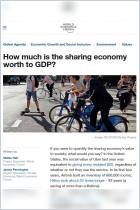
Read or listen offline
Amazon Kindle
auto-generated audio
1×
Log in to listen to the audio summary.
auto-generated audio
Recommendation
Worldwide, the sharing economy is enormous. Peer-to-peer transactions have transformed commerce, making more goods and services available to consumers at lower prices. According to policy expert James Pennington, China is the biggest and fastest adopter of the shared-asset business model. Yet some government leaders question its social costs to communities. getAbstract recommends this brief but thought-provoking text to readers interested in this burgeoning aspect of the new economy.
Summary
About the Author
James Pennington is a project specialist at the World Economic Forum.




















Comment on this summary